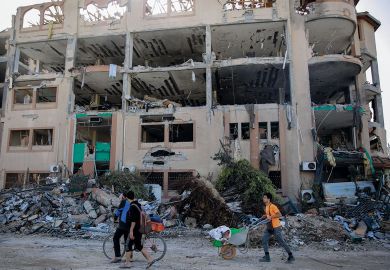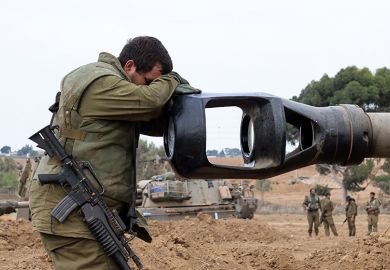Israeli universities have ceased all activities for the day after the country’s largest trade union called a general strike, demanding that the government secures the release of hostages being held in Gaza.
Large protests have been held in major Israeli cities as pressure grows on Benjamin Netanyahu’s government to agree to a ceasefire after six hostages were found dead on 31 August, including two Israeli university students.
The bodies of the six hostages, Carmel Gat, 40, Eden Yerushalmi, 24, Hersh Goldberg-Polin, 23, Alexander Lobanov, 32, Almog Sarusi, 27, and Ori Danino, 25, were found in a tunnel in southern Gaza on Saturday by Israel Defence Forces. All six were abducted alive by Hamas on 7 October. According to the Israeli Health Ministry, autopsies showed the hostages had multiple gunshot wounds.
Israeli universities have faced disruption and international boycotts since the start of the war in Gaza following the Hamas attacks on 7 October last year. Most recently, Hezbollah attacks from Lebanon on northern Israel forced the cancellation of exams and large gatherings on campuses were banned.
In Gaza, all universities have effectively been destroyed in Israeli bombings, with some claiming institutions had been deliberately targeted.
Daniel Chamovitz, president of Ben-Gurion University of the Negev and chairman of the Association of University Heads that represents the country’s research universities, told Times Higher Education that Israeli universities had paid a “massive price” since the war broke out, adding that 75 students from his institution were murdered in the Hamas attack on the Nova music festival, and 10 were taken hostage. In total, 115 people from the university have died.
“There are singularities in time and space when a person or an institution has to stand up and be counted. When you’re old and looking back you’ll say, ‘Well, what side of the line was I on?’”
He said this “was one of those moments, where the universities of Israel had no choice but to join in the general frustration and screaming, saying that we have to sanctify life and not war, and do everything possible to save the lives of our hostages, some of whom were students at our universities”.
Professor Chamovitz added that universities “as bastions of liberalism had to take part” to show support for the families “that there are people behind them who are doing everything possible to make sure that there is a hostage deal”.
Higher education institutions are in “mourning”, he said, describing the atmosphere in the country as “sombre”.
Israeli universities have faced multiple years of disruption since the Covid pandemic, with a constitutional crisis over prime minister Benjamin Netanyahu’s overhaul of the judicial system emerging in 2023 and resulting in campus shutdowns. The latest academic year was delayed until January as a result of the war in Gaza, Professor Chamovitz said, adding: “I’m just hoping for a normal year, but I’m not overly confident that we’ll be there.”
While the country’s labour court announced that the nationwide strike had to come to an end by 14:30 local time, four hours ahead of schedule, Ron Robin, president of the University of Haifa told THE that higher education institutions felt “obligated” to strike, and said there could be further action to come.
While university campuses remain open, he said no activity was taking place at all nine research universities across the country.
“As most Israelis – as all Israelis, I would expect – are very concerned about the fate of our hostages, but we feel we need to express our concern in a very forceful manner to our government, and that’s what we’re doing today,” Professor Robin said.
Universities were “insisting” that the releasing of the hostages “be at the top of the list” of priorities for the government, he said. “The release of our hostages is paramount. It should happen now, and it should be the first and most important priority of government at this particular time point.”
While he did not expect to see action from the government following the protests, Professor Robin said it was a “so-called warning shot that we are firing, and we will do more. We are obligated to do more to save lives”.
Register to continue
Why register?
- Registration is free and only takes a moment
- Once registered, you can read 3 articles a month
- Sign up for our newsletter
Subscribe
Or subscribe for unlimited access to:
- Unlimited access to news, views, insights & reviews
- Digital editions
- Digital access to THE’s university and college rankings analysis
Already registered or a current subscriber?







